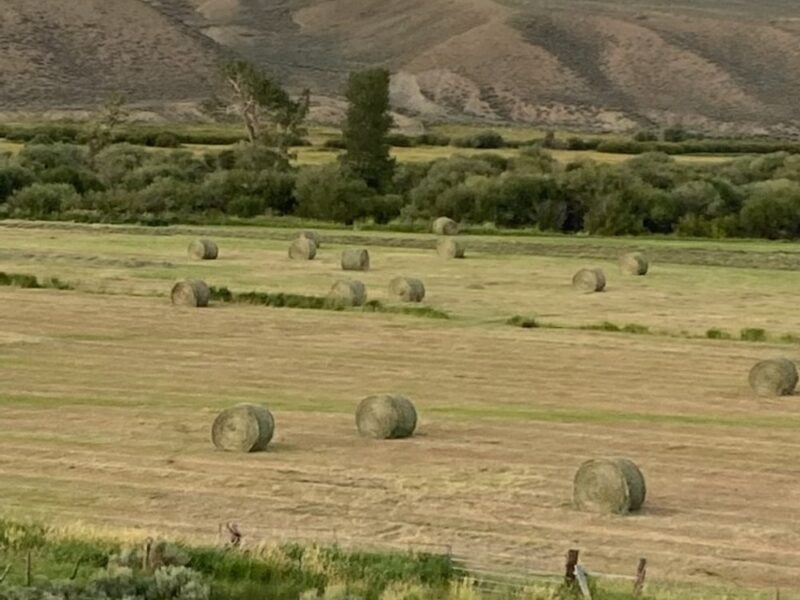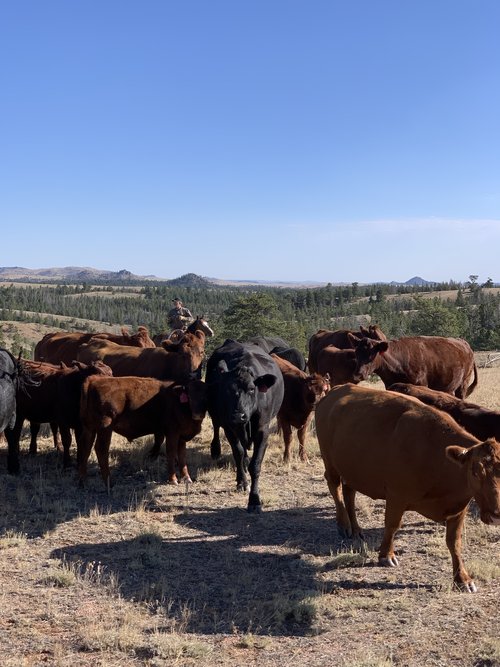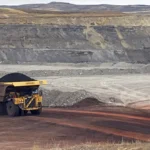Ranchers Highlight Major Issues Within Agriculture Industry
Water rights, government regulations and economy seen as challenges
- Published In: Other News & Features
- Last Updated: Dec 09, 2022

Pictured above is the Peternal Cattle Company in Kemmerer. Owner Robert Peternal said the cost of diesel for his tractor to move hay bales has increased significantly. (Courtesy photo from Robert Peternal)
By Shen Wu Tan
Special to the Wyoming Truth
CASPER, Wyo.—It’s not easy being a rancher in Wyoming.
Not only do they confront the wrath of Mother Nature, but they also must jump over government hurdles and navigate market conditions, among other challenges.
Ranchers from across the Cowboy State who attended the Wyoming Natural Resource Rendezvous Convention and Trade Show this week spoke to the Wyoming Truth about issues affecting the agricultural industry. A few recurring themes emerged from those conversations: inflation, water rights and government regulations.
Robert Peternal, who operates Peternal Cattle Company in Kemmerer, told the Wyoming Truth that he is grappling with higher prices for fuel and supplies, such as fertilizer. The rancher estimated that it costs him about 120% more in diesel to feed his cows compared to two years ago.

“[Legislators] need to do something [about] the economy and the oil and gas situation,” Paternal said. “The price of diesel is so high this year, and we probably go through 10 gallons of diesel everyday just to feed the cows…. Just everything is expensive.”
Northwest of Kemmerer, Tim Teichert co-runs a family ranch called Teichert Brothers LLC, a Red Angus and Black Angus cattle operation in Cokeville.
Teichert, 55, discussed how neighboring states want to take Wyoming’s water. The ongoing drought doesn’t help, either.
“You’re dealing with other compacts, and right now, there’s definitely a shortage of water everywhere that you look,” Teichert said. “You’re looking at towns from Denver to Salt Lake [City] to San Diego and Phoenix that definitely want water for their cities. And they seem to always want to look upstream to see what we’re doing with ours and trying to get ours.”
He continued, “Water’s your livelihood, and it’s just one of the things you would really need to protect.”
In addition, Teichert proposed that the government adjust the boundaries of the brucellosis surveillance area, which includes his land, although he claimed his cows have not tested positive for the disease. Brucellosis is a contagious disease of livestock with high rates of morbidity and lifetime sterility and can infect people, according to the California Department of Food and Agriculture.
To rancher Amanda McGinnis, one of the biggest threats ranchers face is one-sided information or misinformation.
“They want to talk about how cows produce methane, but nobody wants to talk about the land that we run,” McGinnis said. “I mean 8,000 acres can offset an awful lot of greenhouse gases, but we don’t always get credit for the whole picture.”
McGinnis, 35, and her husband operate Diamond H Ranch, which is situated between La Barge and Kemmerer. She said ranchers cannot stay in business if they don’t care for their land, noting that the soil needs to be healthy and the water needs to be clean.
“We want the climate to be good, too,” McGinnis said. “Everybody benefits from a more stable climate—cattle and ranchers included.”

Politics and agriculture
Mark Eisele, owner of King Ranch in Cheyenne and vice president of the National Cattlemen’s Beef Association, rattled off a list of issues within the agricultural industry, including protection of natural resources and over regulation by the federal government.
Part of the King Ranch sits on public lands, and the federal government seized a portion of it years ago without compensation, but with a promise to give it back, Eisele said. However, Eisele claimed the government did not return the land and eventually kicked the ranch off that land.
“We’re feeling a lot of pressure, not just from the federal government, but also from [the] state and municipalities,” Teichert said.
“We’re constantly challenged by subdivisions and developers,” he said. “So, we feel this constant pressure to sell or to give up or surrender our rights to this property. And I basically grew up on this ranch, and now my kids have grown up on this ranch. We’re in this for the long haul.”
Teichert’s concerns also include trade practices and market concentration by big packers and retailers.
He would like legislators to focus on protecting and maintaining state-owned lands, addressing infrastructure issues with highways and bridges and ensuring mutually beneficial relationships with federal agencies that oversee public lands.
Jim Magagna, a sheep rancher and executive vice president of the Wyoming Stock Growers Association, identified three factors that are critical to ranching: the government, weather and market.
“If two of those three are positive, it’s a decent year in ranching,” Magagna told the Wyoming Truth. “If all three are negative, it’s really challenging. The last couple of years in most of Wyoming, the drought, the weather has been the biggest challenge.”
While the markets for cattle have climbed, lamb and wool markets have declined, Magagna noted.
Regarding politics, Magagna is concerned about what’s happening with some of the endangered species, such as the sage grouse.
“Our people want to take care of the resources,” Magagna said. “Their living depends on it. And if they’ve got government people who work with them and make decisions based on what’s on the ground, it works well. But if you have too many decisions being made in Washington, they just don’t work out here on the ground.”
Magagna acknowledged that Sen. John Barrasso (R-WY) has introduced some bills that could benefit the agricultural industry, while Sen. Cynthia Lummis (R-WY) is a rancher who, therefore, has a better understanding of the issues.
Before a silent auction at the natural resource convention Wednesday, Gov. Mark Gordon reassured ranchers and agricultural producers that he is doing what he can to help them thrive. The governor announced that his budget will allocate funding for predator control and protection of water resources. What’s more, Gordon said that he wants to remove grizzly bears from the endangered species list and to keep gray wolves off that list.
“This is where Wyoming’s heart beats,” Gordon told the audience. “This is where things happen, and this is the group of people who make this state what it is. We need to do more to recognize that. We need to do more to listen to that.”













